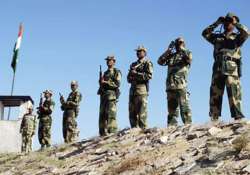India may move troops to peacetime positions on Pakistan border
Islamabad, May 14: India is likely to thin-out troops from wartime positions on the border with Pakistan, where they were deployed after the 2008 Mumbai terrorist attacks, according to a media report today. The two

Islamabad, May 14: India is likely to thin-out troops from wartime positions on the border with Pakistan, where they were deployed after the 2008 Mumbai terrorist attacks, according to a media report today.
The two countries reached an understanding on withdrawing troops during President Asif Ali Zardari's visit to New Delhi on April 8, The Express Tribune quoted unnamed military and diplomatic officials as saying.
The withdrawal of troops to peacetime positions is among the first substantial overtures since the two sides resumed peace talks after a two year gap in the wake of the Mumbai attacks that killed 166 people.
A formal announcement about the withdrawal is likely when the Indian Prime Minister visits Islamabad, possibly during the latter half of this year.
“It is going to happen in September or October,” an unnamed official told the daily.
Political figures privy to the President's day-long visit to India said the major development was a result of talks through backdoor channels, which had been active for the past couple of years.
Officials said the Indian government had mobilised troops to take wartime positions at the disputed border with Pakistan, particularly in Kashmir, immediately after terrorists launched the attacks in India's commercial hub of Mumbai.
The attacks in Mumbai were blamed on the Pakistan-based Lashkar-e-Toiba.
According to experts, in a wartime scenario, the regular army starts manning the border instead of special forces meant for protecting boundaries.
India has the Border Security Force and Pakistan has Rangers for this purpose.
Officials said Pakistan responded to the Indian move by sending troops to “concentration areas” or forward bases along the working boundary at Sialkot and some other locations.
A senior military official said that though troops were mobilised by India, there was no serious tension at the border like in 2002, after an attack on Indian parliament that was blamed on two Pakistan-based groups.
“There has never been an alert. Neither on our side nor on the other,” said the military official.
Defence experts said any move by India will provide Pakistan space to deploy more troops in the north of the country, where the military is busy fighting Al Qaeda and the local Taliban.
The US and other Western states fighting the insurgency in Afghanistan too want Pakistan to curb terrorists on its soil.
Besides the withdrawal of troops, Prime Minister Manmohan Singh might have other “pleasant” surprises, the report said.
Officials said “major announcements” were expected on Siachen, the glacier known as world's highest battlefield, and the Sir Creek boundary dispute.
They said there is a possibly that both sides might agree on troop withdrawal from Siachen, where an avalanche buried 139 people at a high-altitude Pakistan Army camp on April 7.
Pakistan's civil and military leaders, including army chief Gen Ashfaq Pervez Kayani, have said both countries should withdraw troops from the border to divert resources to development.
The two countries reached an understanding on withdrawing troops during President Asif Ali Zardari's visit to New Delhi on April 8, The Express Tribune quoted unnamed military and diplomatic officials as saying.
The withdrawal of troops to peacetime positions is among the first substantial overtures since the two sides resumed peace talks after a two year gap in the wake of the Mumbai attacks that killed 166 people.
A formal announcement about the withdrawal is likely when the Indian Prime Minister visits Islamabad, possibly during the latter half of this year.
“It is going to happen in September or October,” an unnamed official told the daily.
Political figures privy to the President's day-long visit to India said the major development was a result of talks through backdoor channels, which had been active for the past couple of years.
Officials said the Indian government had mobilised troops to take wartime positions at the disputed border with Pakistan, particularly in Kashmir, immediately after terrorists launched the attacks in India's commercial hub of Mumbai.
The attacks in Mumbai were blamed on the Pakistan-based Lashkar-e-Toiba.
According to experts, in a wartime scenario, the regular army starts manning the border instead of special forces meant for protecting boundaries.
India has the Border Security Force and Pakistan has Rangers for this purpose.
Officials said Pakistan responded to the Indian move by sending troops to “concentration areas” or forward bases along the working boundary at Sialkot and some other locations.
A senior military official said that though troops were mobilised by India, there was no serious tension at the border like in 2002, after an attack on Indian parliament that was blamed on two Pakistan-based groups.
“There has never been an alert. Neither on our side nor on the other,” said the military official.
Defence experts said any move by India will provide Pakistan space to deploy more troops in the north of the country, where the military is busy fighting Al Qaeda and the local Taliban.
The US and other Western states fighting the insurgency in Afghanistan too want Pakistan to curb terrorists on its soil.
Besides the withdrawal of troops, Prime Minister Manmohan Singh might have other “pleasant” surprises, the report said.
Officials said “major announcements” were expected on Siachen, the glacier known as world's highest battlefield, and the Sir Creek boundary dispute.
They said there is a possibly that both sides might agree on troop withdrawal from Siachen, where an avalanche buried 139 people at a high-altitude Pakistan Army camp on April 7.
Pakistan's civil and military leaders, including army chief Gen Ashfaq Pervez Kayani, have said both countries should withdraw troops from the border to divert resources to development.